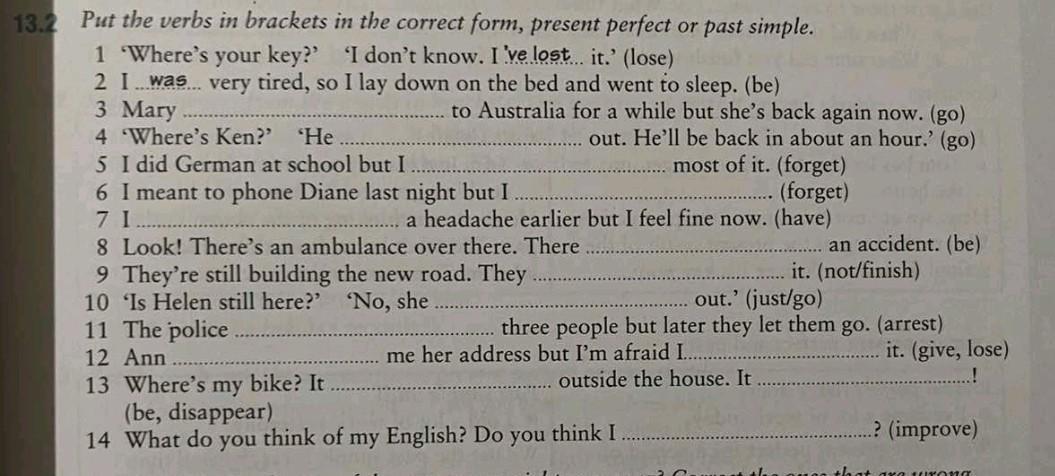помоги пожалуйста дам 85 баллов

Ответы
- Mary went to Australia for a while but she's back again now. (go)
Объяснение: Данное предложение описывает действие, которое произошло в прошлом и уже завершилось. Используется прошедшее время глагола "go" - "went".
- 'Where's Ken?' 'He went out. He'll be back in about an hour.' (go)
Объяснение: Здесь также описывается прошедшее действие, когда Ken вышел. Используется прошедшее время глагола "go" - "went".
- I did German at school but I have forgotten most of it. (forget)
Объяснение: В данном случае используется Present Perfect, так как упоминается период времени, начавшийся в прошлом (когда я учил немецкий в школе), и продолжающийся до настоящего момента. Глагол "forget" используется в третьей форме "forgotten".
- I meant to phone Diane last night but I forgot. (forget)
Объяснение: Здесь используется Past Simple, так как речь идет о конкретном прошлом действии (забыл позвонить Diane вчера). Глагол "forget" используется в основной форме.
- I had a headache earlier but I feel fine now. (have)
Объяснение: Здесь используется Past Simple, так как описывается действие, которое произошло в прошлом и уже завершилось. Глагол "have" используется в третьей форме "had".
- Look! There's an ambulance over there. There has been an accident. (be)
Объяснение: Здесь используется Present Perfect, так как упоминается прошедшее действие, которое имеет связь с настоящим моментом (произошла авария). Глагол "be" используется в третьей форме "been".
- They're still building the new road. They haven't finished it. (not/finish)
Объяснение: В данном случае используется Present Perfect, так как упоминается период времени, начавшийся в прошлом (они до сих пор строят новую дорогу) и продолжающийся до настоящего момента. Глагол "finish" используется в третьей форме "finished", с отрицанием "haven't".
- 'Is Helen still here?' 'No, she has just gone out.' (just/go)
Объяснение: Здесь используется Present Perfect, так как упоминается совсем недавнее прошедшее действие (она только что ушла). Глагол "go" используется в третьей форме "gone".
- The police arrested three people but later they let them go. (arrest)
Объяснение: В данном случае используется Past Simple, так как описываются два последовательных действия, произошедших в прошлом (полиция арестовала трех людей, но позже отпустила их). Глагол "arrest" используется в основной форме.
- Ann gave me her address but I'm afraid I lost it. (give, lose)
Объяснение: Здесь используется Past Simple, так как описываются два последовательных действия, произошедших в прошлом (Ann дала мне свой адрес, но я, к сожалению, потерял его). Глаголы "give" и "lose" используются в основной форме.
- Where's my bike? It was outside the house. It has disappeared. (be, disappear)
Объяснение: Здесь используется Past Simple, так как описывается прошедшее действие (мой велосипед был снаружи дома). Затем используется Present Perfect, чтобы описать результат этого прошедшего действия (он исчез). Глаголы "be" и "disappear" используются в соответствующих формах.
- What do you think of my English? Do you think I have improved? (improve)
Объяснение: В данном случае используется Present Perfect, так как речь идет о периоде времени, начавшемся в прошлом и продолжающемся до настоящего момента (улучшилось ли мое английское). Глагол "improve" используется в третьей форме "improved".
Ответ:
Mary went to Australia for a while but she's back again now. (go)
'Where's Ken?' 'He went out. He'll be back in about an hour.' (go)
I did German at school but I have forgotten most of it. (forget)
I meant to phone Diane last night but I forgot. (forget)
I had a headache earlier but I feel fine now. (have)
Look! There's an ambulance over there. There has been an accident. (be)
They're still building the new road. They haven't finished it. (not/finish)
'Is Helen still here?' 'No, she has just gone out.' (just/go)
The police arrested three people but later they let them go. (arrest)
Ann gave me her address but I'm afraid I lost it. (give, lose)
Where's my bike? It was outside the house. It has disappeared. (be, disappear)
What do you think of my English? Do you think I have improved? (improve)
Объяснение:
Present Perfect - в данном случае используется
Глагол "improve" используется в третьей форме "improved".